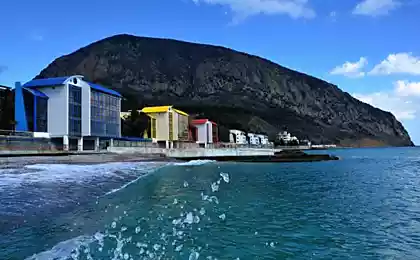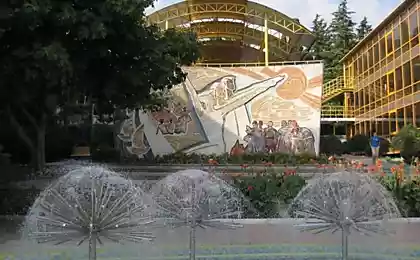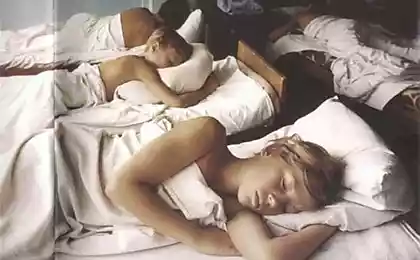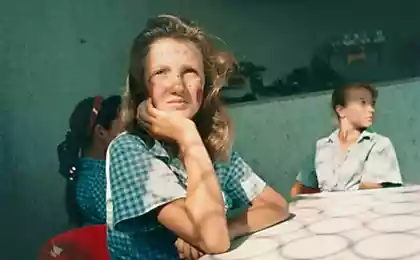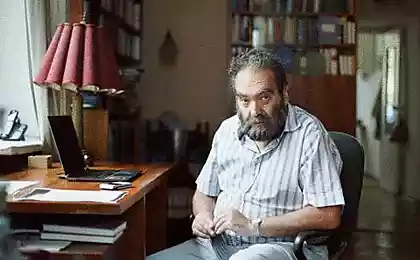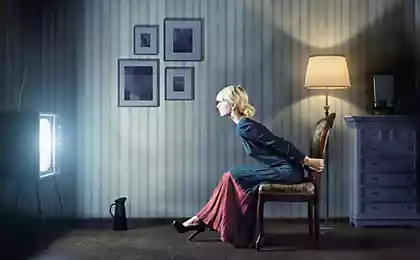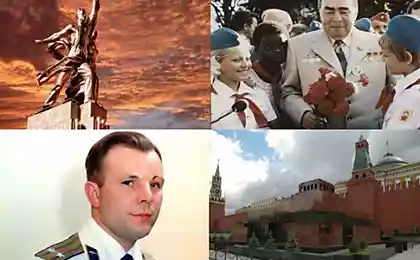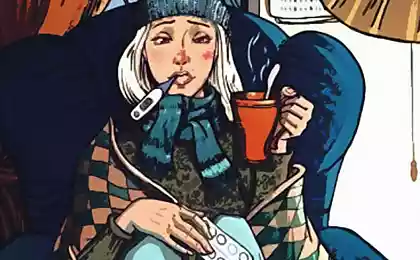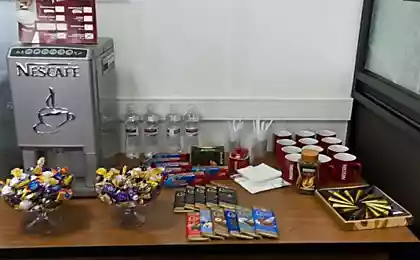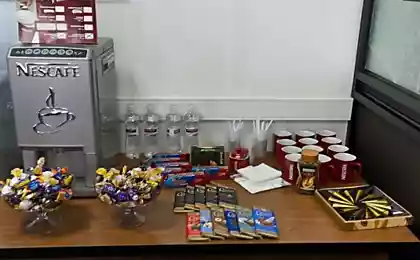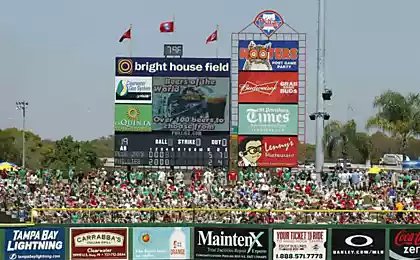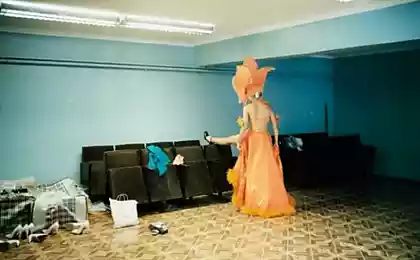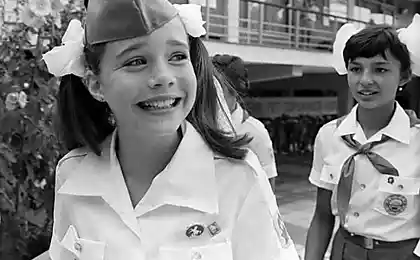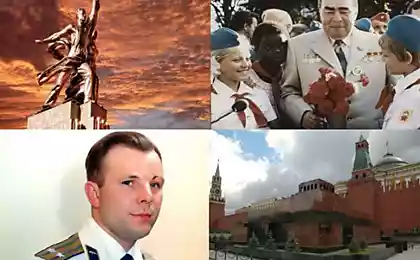4450
The history of "Artek"
Artek story and photo
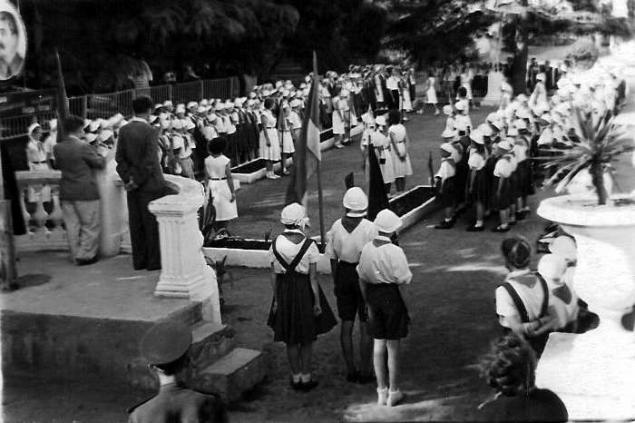
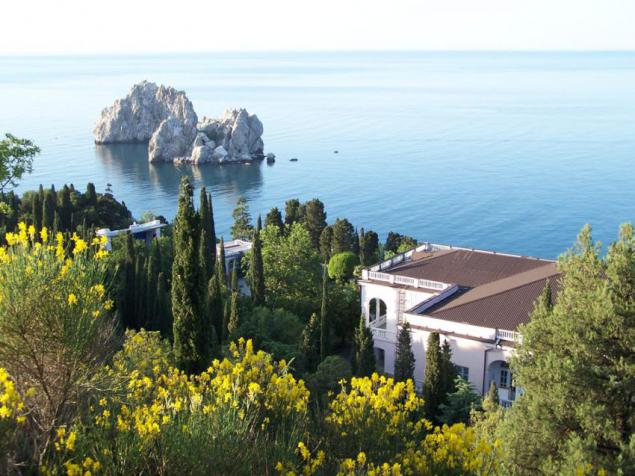
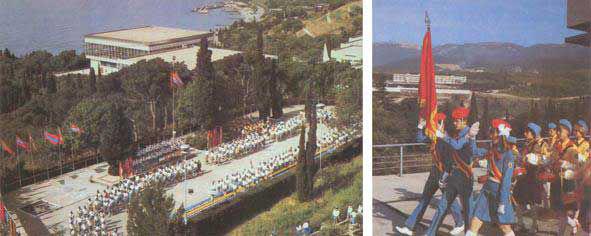
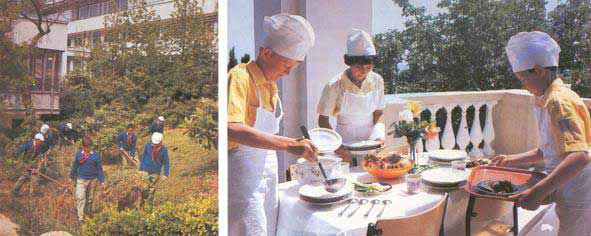
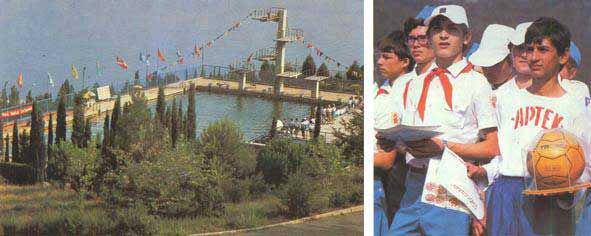
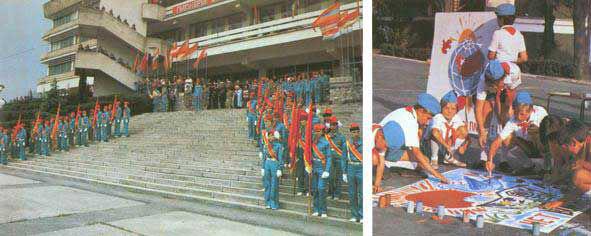
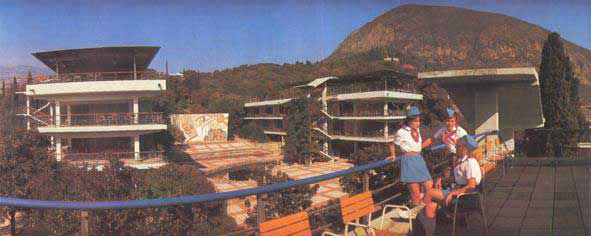
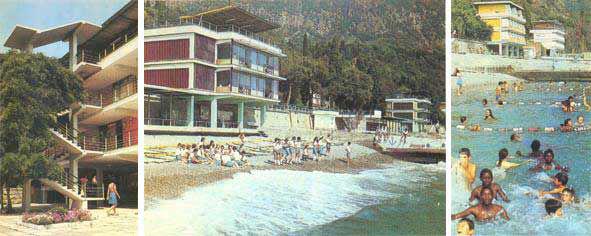
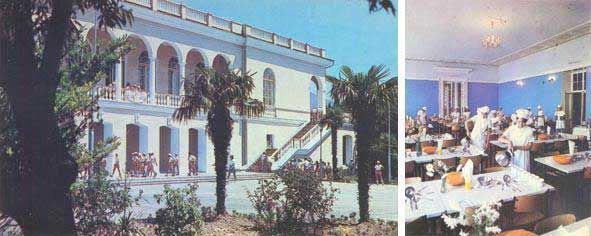
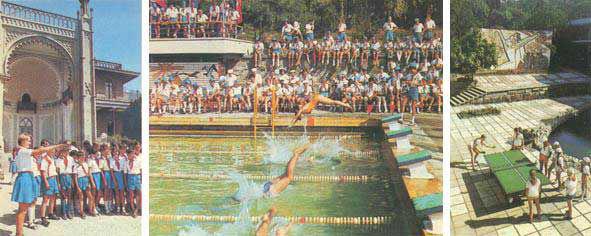
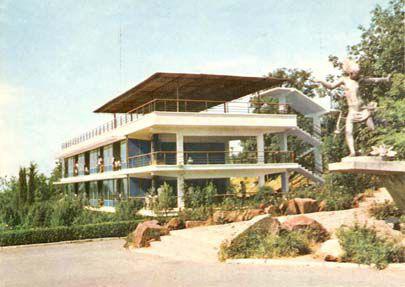
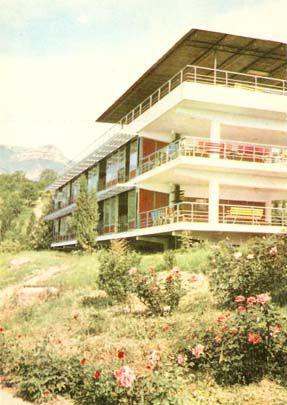
Came in 1924. In a quiet autumn evening at the foot of Ayu-Dag walked arrived from Moscow Chairman of the Central Committee of ROKK Zinovy Petrovich Soloviev. He rested, admiring nature and deeply inhaled the crisp mountain-sea air, but his thoughts were far away.
His concern about the issue that as soon as possible to improve health of children, especially those who have suffered for years of imperialist and civil war and years of devastation. He dreamed of creating such institutions, "where doctors had to deal not only with the individual child, and with organized children's groups." Camp-resort, "medical camp" - that wanted to create Zinovy Petrovich.
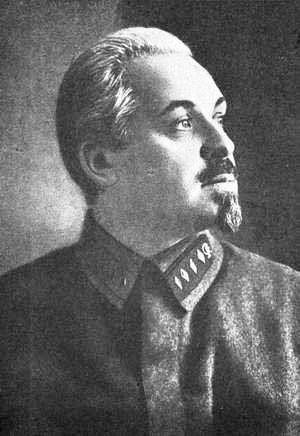
Solovyov visited many places on the coast, visited Koktebel, near Feodosia, Sudak, figured here and there, but no matter what I could not stop. So, spending their holidays in the Crimean branch Gurzufsky military resort station (now the sanatorium "Gurzufsky"), Zinovy Petrovich walked in the tract Artek, which granted him in all respects.
Particularly pleased Solovyov fact that the campsite can be expanded over time, and the camp "will unfold in the real pioneer." A Place in the camp was chosen as it is impossible prosper.
No less successful was the organizer and the selection camp. Open to the beginning of 1925 sanatorium camp was entrusted to Dr. Fyodor Fyodorovich Shishmareva, who was then head of the children's sanatorium in Ai-Danil. FF Shishmarev played a significant role in the life "Artek". He gave him eight years of his life, working mainly stretch doctor. Exceptional organizer, a great doctor - he was the right hand 3. P. Solovyov in the organization of treatment and rest of children.

And June 16, 1925 in a cozy and picturesque bay, where peace and quiet guarding ancient Ayu-Dag, children's voices were heard, and the sounds of bugle flag was hoisted up - so in Crimea opened his first shift camp-resort of the Red Cross in the RSFSR " Artek ".
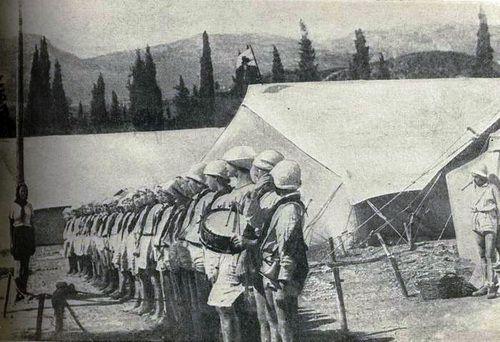
80 First Artek lived near the sea, four canvas tents. In the first year of "Artek" After four shifts took 320 children.
Children placed in tents, high, bright, with wooden floors. Although their decoration and consisted of simple wooden, covered with canvas beds, wooden stools and gross bedside tables, but all contained in a large order. The best tent was designed as an insulator, which stood on the camp at a distance.
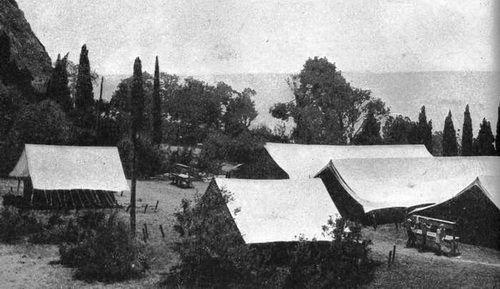
Dining use the space under the tent, where it was placed six dining tables and benches. Although the tables were roughly knocked together from planks, covered with white tablecloths them, and each was a pioneer and napkin ring napkin.
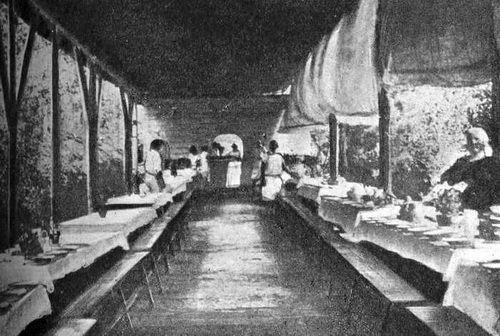
Was organized as a club-library, which was assigned by the best room Potemkin house. There's also kept the children gathered collection, tools and materials for manual labor.
About the sea, which is now broken "campfire" area with an amphitheater for guests was sports grounds. Here, in the first years of the fires were lit Artek.
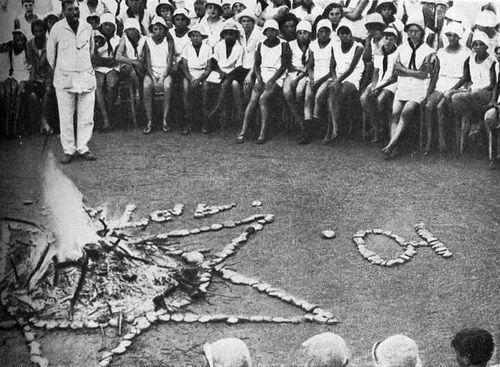
In the summer of 1925, "Artek" visits Clara Zetkin, who would later write: "Would you like to see happy children free? Visit summer camp hosted by the Red Cross in "Artek" ... ".
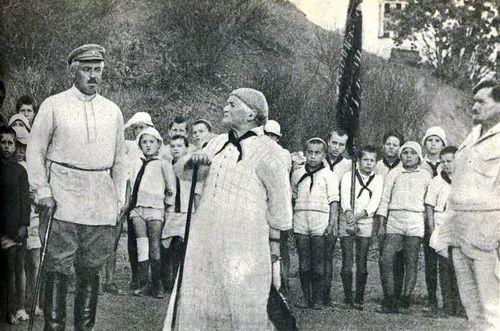
And foreign visitors began to visit and learn ... In the twenties in the camp rested children and adults from Germany, Holland, Denmark, Norway, Poland, France, Sweden.
July 24, 1927 in "Artek" put full-time counselor position of company officer. Teachers have been working on local history and natural history, guided tours, children were taught how to collect and prepare herbarium collections and read them lectures, were interviewed. On educational work was given 2-3 hours a day. In the daily routine included compulsory labor - children cleaned the park, clean beaches, as well as helping in the neighborhood agricultural economy. They gathered their vineyards, cleaned hay is harvested fruit.
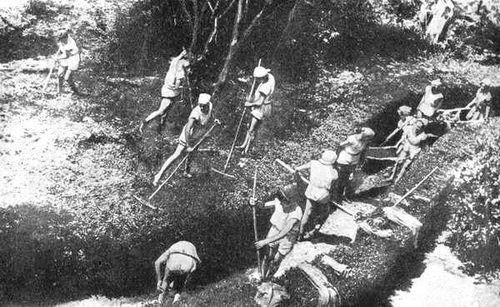
Excursions in those years have been few. It was difficult, as in "Artek" there was no transport, and often the children brought from Sevastopol on horses harnessed to the droshky.
The first years of the camp showed that it was necessary to think about the permanent buildings instead of tents, which are not paid off. In the afternoon, when it was necessary to carry out "silent" h - hot night - cold. This became especially clear when one night a storm with strong thunderstorms, destroyed the tents and frightened children.
In 1928 Zinovy Petrovich raised the question of the reorganization of the camp in a permanent camp-resort that operates all year round.
And in the same year, the children no longer rested in the tents, and new houses.
Thirties. Camp international assistance and friendship.
In 1930, "Artek" celebrated its fifth anniversary of the opening of the second camp. Now in "Artek" appeared "lower" and "upper" camp. Change in the number of children increased from 80 to 200, and a year - to 2,040 children.
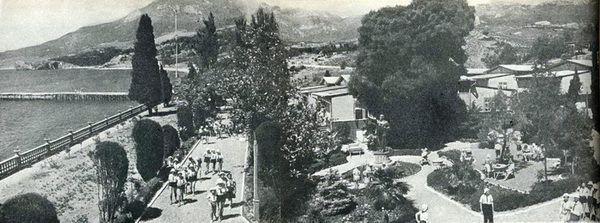
1932. The camp organized by Children's Technology Station and Museum "Artek».
In 1934, "Artek" was first visited by the head of the Soviet government - Vyacheslav Molotov.
In 1936, the government decided to transfer "Artek" located next holiday home Central Executive Committee of the USSR "Suuk-Su", which greatly expanded the possession of the camp.
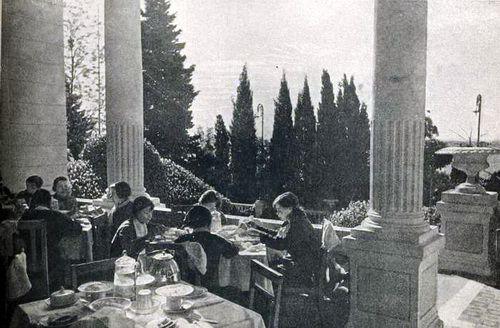
In the "Artek" vividly respond to all the events happening in the world: in 1937, for the whole summer here come the children of war on Spain in flames.
In the summer of 1939 in "Artek" with his son Timur Arkady Gaidar rest. He loves to climb with Artek on Ayu-Dag. Here he decided to write his famous novel "The Military Secret».
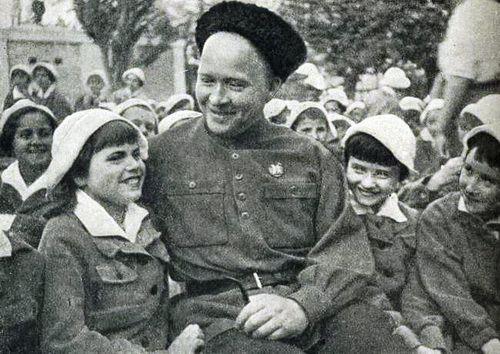
The popularity of "Artek" has gone far beyond the Soviet Union. In each camp - the "upper", "lower", "Suuk-Su" to "15th dacha" - is working on their own: its ruler, camp flag, its senior leader, opening and closing shifts.
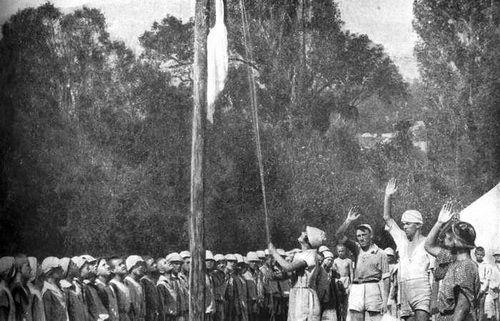
Enough time is allocated as fun and entertainment. Each unit except his gang work, takes hold of one of the camp activities - organize a competition for the best paper company officer, chess tournament, war game, recitals, sporting events ...
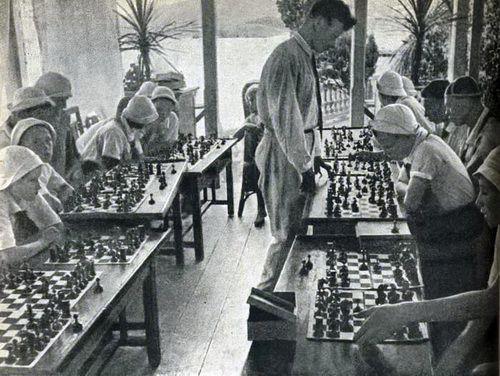
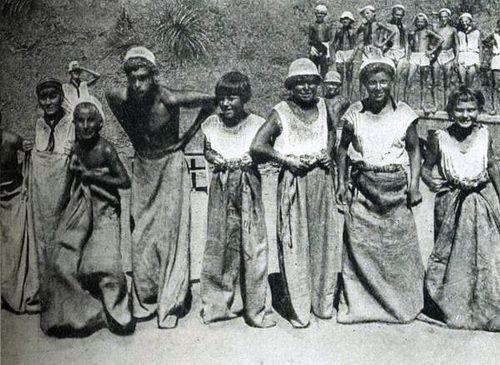
Life is full of diversity Artek - one day is like another, and daily diaries recording a company officer, as a rule, ended with the words: "Today, as always, it was fun," "more interesting than usual, was today».
"Artek" wartime. Revival.
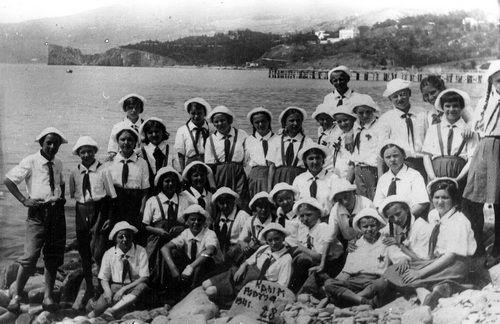
1941. In the "Artek" only drove children and 22 June the Great Patriotic War. The very next day Artek sent a telegram to Moscow: "Resting in the sun" Artek ", always ready to defend the homeland." This change would later be called the longest in the history of the camp, it lasted three and a half years. Two hundred children from the western regions and republics, occupied by the Nazis, along with counselors, physician and head of the camp were evacuated to the rear - Altay Belokurikha resort village. The boys and adults lived in the Artek laws, helps families of soldiers, wounded in the hospitals, collected scrap metal for the construction of tanks and aircraft.
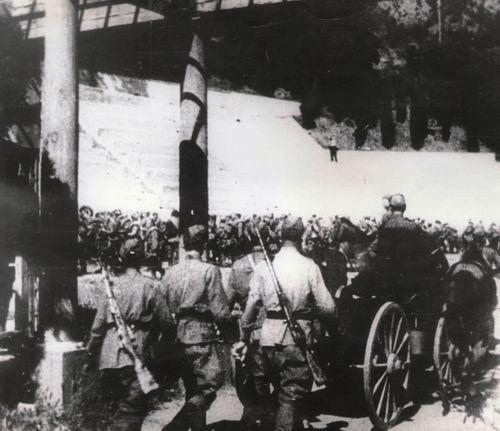
And the "Artek" was occupied. April 15, 1944 Independent Coastal Army troops liberated the "Artek". The camp lay in ruins.
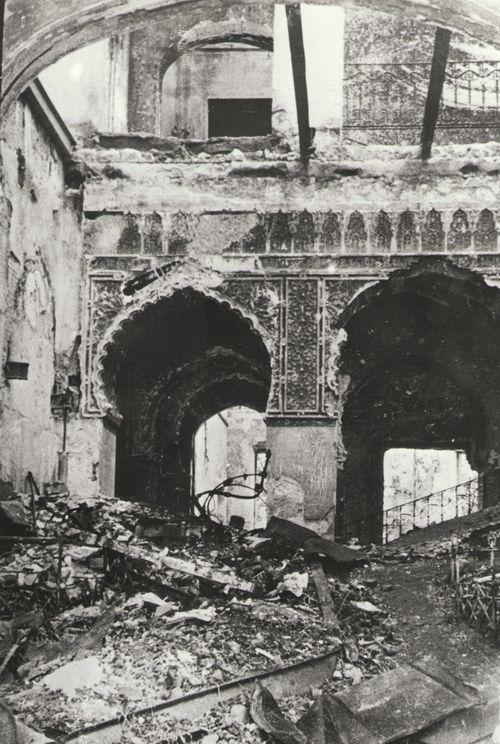
Despite the difficult times of war, were started restoration work, and three months later - August 6, 1944 - Crimean camp hosted 500 children.
In 1945 a commemorative change in "Artek" already in 1200 rested guys. September 13 newspapers and radio reported the good news: in connection with the twentieth anniversary, for outstanding achievements in the education Pioneers Union sanatorium pioneer camp "Artek" them. VM Molotov was awarded the Order of the Red Banner.
In 1945, on the map, "Artek" appears camp "Cypress", a former rest home "kolkhoz youth."
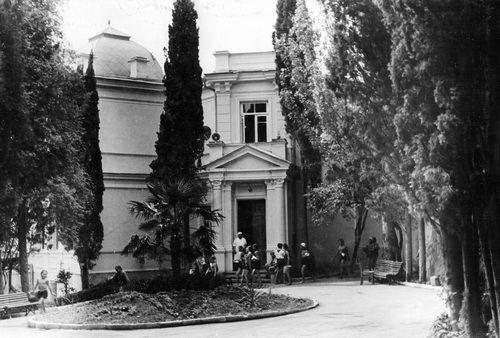
And if before the war Artek help everyone in this difficult time began to come help them. In the spring of 1945 the wife of British Prime Minister Winston Churchill visited Clementine "Artek" and presented 15 canvas tents, became the basis of the post-war camps.
The summer of 1947 for the first time after the war to rest in "Artek" were invited to a group of children from Czechoslovakia and Poland. Children wrote: "We will forever be remembered ... the arrival in the Crimea. Everywhere we met with a simple, gentle, good people. And the beauty of the camp we just struck. We do not believe that all this can belong to children. We are so grateful for the care of children ... about us, for the sea, for the sun, for friendship, for songs that we learned here. " Artek together with their foreign guests had a bonfire dedicated to the friendship of Slavic peoples. With great joy young Czechs and Poles took from his friends Artek gifts and friendship embers from Artek bonfires.
Fifties. All flags are to visit us.
In the "Artek" come more and more foreign delegations from Bulgaria, Hungary, Czechoslovakia, the German Democratic Republic, China, Mongolia, Korea, Poland, Romania, Vietnam, France, Finland, England, Norway, Luxembourg, West Germany, Belgium, Albania , Sweden, Denmark.
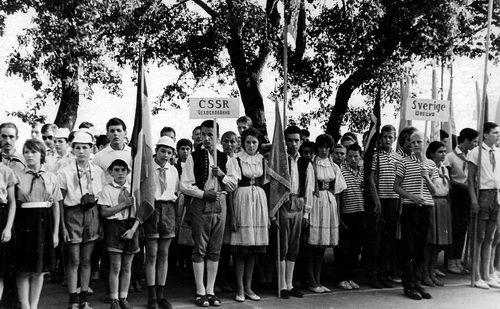
The main pedagogical principles impact on child counselors considered alive, specific case, which is entirely should grab guys. Becoming popular relay race of peace and friendship festival "For peace and friendship," International Sports Games "Friendship».
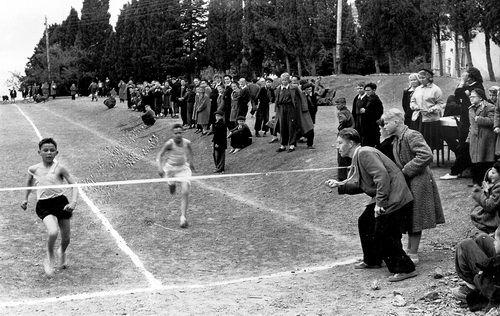
There is a form of work, as a celebration of friendship. It was held on the green lawns of the park Upper Camp (now Park "Mountain"), there were fun rides in different places of the park - competitions, was equipped with a separate area of international friendship where you can write and send a letter to Artek postcard to share with your friends addresses .
Often passed the baton labor, for example, in the construction of the stadium in the Lower Camp (now "Marine") worked alongside children from Bulgaria, the German Democratic Republic, Czechoslovakia, Italy and Sweden.
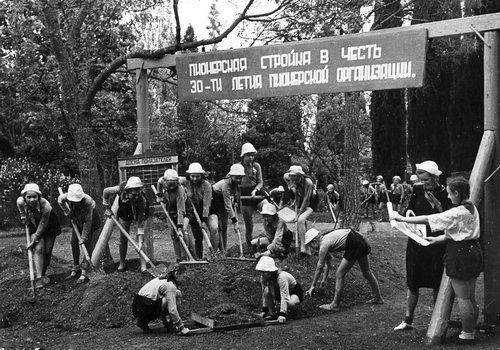
Postwar "Artek" gets to his feet again and ready to help children around the world.
Characteristic of the time this episode: Belgian pioneers, leaving to his homeland, bitterly guys say that at home they can not do sports, no sports facilities and equipment. Only in "Artek" and played enough pleasure, and now do not play ... This conversation pioneers learned 4th camp session in 1959 and decided: we must help the Belgians. Board of sports club "Olympia" Invite the children to share sports equipment with Belgian pioneers. But the children offered another: "Let us work, work as it should, and with the money to buy equipment and send the Belgian friends." The proposal was approved. Council "Olympia" established "piggy bank friendship." The guys worked on the construction, parks and vineyards, amassing loungers on the beach, repairing furniture and clothes. In the piggy bank soon became more than 5000 rubles. With this money in Simferopol bought sports equipment, and a large box-parcel was sent to Belgium.
Sixties. International change.
Now children from abroad rest in "Artek" not only throughout the year, but also runs a special international change.
Developed its own traditions and customs: the baton of friendship, national days of countries, international voluntary Sunday, drawing 'Cup continents "of sports games, evening national games and dances, merry holiday attractions, evening meetings on the interests and many other fun and interesting things.
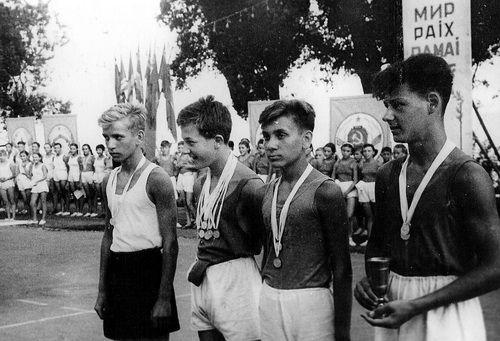
Peace Day has become a tradition. Usually in the morning rose the blue flags of the world, held a solemn line. From the pier "sea" of the camp in neutral waters left the boat with the Post World. Representatives of foreign delegations were thrown into the sea dozens of bottles with clogged in them a letter of appeal to children all over the world.
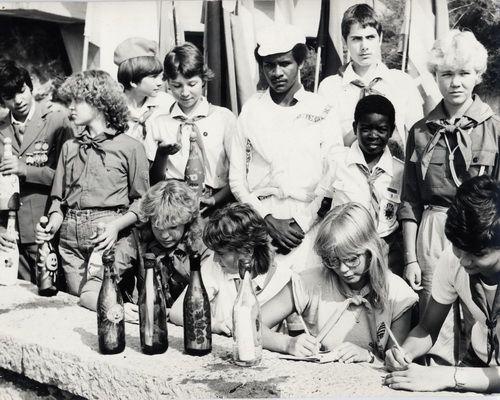
There was a tradition to sign the declaration or appeal against any social organization of the world, for example, the World Peace Council.
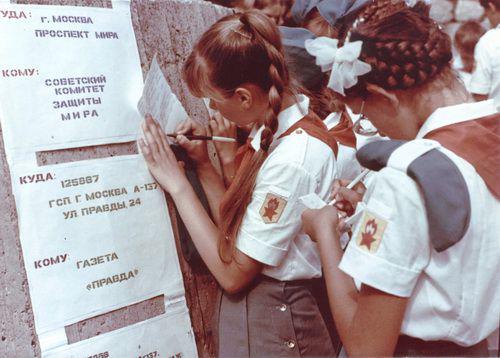
Were held International Children Sports Games "Friendship" with the participation of young athletes around the world.
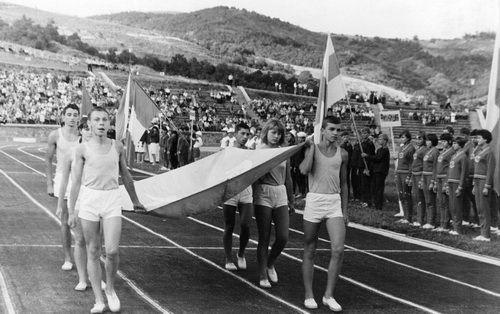
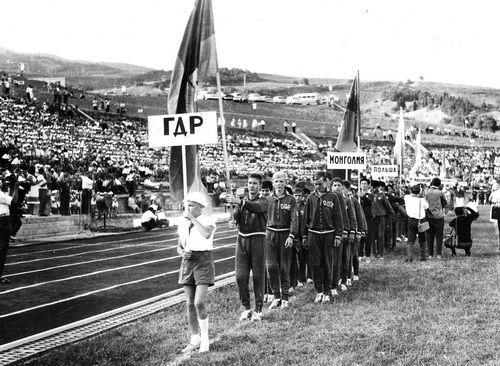
Pass-Union Pioneer rallies, which involved numerous foreign delegations and high foreign guests: the head of the Iranian government, Amir Abbas Hoveyda, chairman of the Council of Ministers of the Republic of Chad Francois Trombalbay, the famous American astronaut Francis Borman, which the crew of the spaceship "Apollo - 8" in December 1968 made a flight to the moon.
Camp reacts and responds to all the events that occur in the world.
Seventies. "May there always be sunshine!»
"Artek" become a place of discussion, the main problem - the problem of preserving peace in the world. A major role in solving this problem was transferred to children's organizations and their important role in the education of children and adolescents in a spirit of friendship, peace and solidarity.
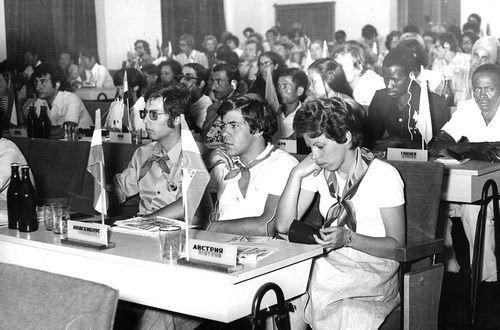
The conference "Multi-colored ties round table" of the seventies was attended by between 39 and 103 representatives of foreign children and youth organizations. The conference made presentations outstanding personalities of the time: The Secretary-General of the World Federation of Democratic Youth Michel Jouet, Secretary General of the United Democratic Youth Organization of Cyprus Andonakis Christodoulou and many others.
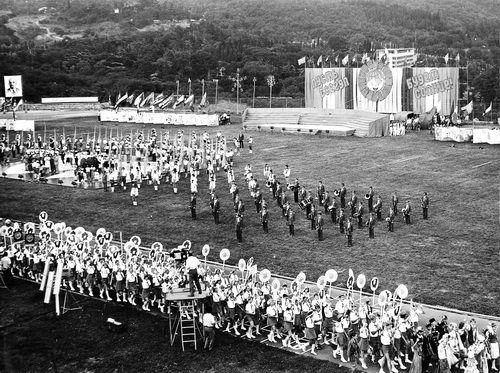
The main event in international life "Artek" seventies - International Children's Festival "May There Always Be Sunshine" (1977.), Who became a prologue to the XI World Festival of Youth in Cuba. The program provided its start in Moscow, and the continuation and the ending in "Artek».
Such proportions did not know the history of international children's movement. In the "Artek" was attended by 1500 children and 500 guests of honor of the 158 international, regional and national children's and youth organizations of 103 countries in the world.
To create a spirit of unity, solidarity, friendship organizers had thought every detail of the program, even coming in "Artek". Recalls journalist V. Kryuchkov, who covered the events of the festival, first of all the delegates gathered in Moscow (then the capital of the Union of Soviet Socialist Republics), handed over the symbolic key to "Artek", and then a special express friendship was sent to "Artek".
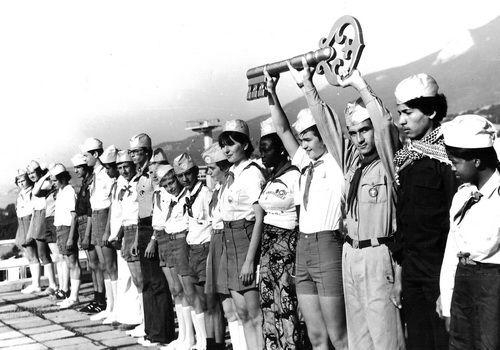
In these days of "Artek" running club "Naturalist", "Breeze", "collector", "Humanity", "Chess and Checkers", "symbol", "Game", "Skillful hands", "screen", where children demonstrated their skills, share experiences.
During the festival is a traditional conference of heads of children's and youth organizations under the slogan "For a happy childhood in a peaceful world».
The festival has left an indelible impression on all participants. Here, for example, statements of Eric Makkasi, a member of the children's section of the National Council of American-Soviet Friendship, "in" Artek "... flags on the mast raised are not ordinary, but of colorful neckties. Bonfires are lit solidarity is not a lighter or matches, and from the sun. A symbolic key was handed in Moscow, drove around the "Artek". Not forgotten in "Artek" and "Maritime mail" that has existed since ancient times. Now, when the world hangs communications satellites and telegraph cable laid in all corners of the globe, "shipping service" may seem to someone naive idea. But I personally like to think that in the sea waves floats my bottle with my letter. I try to imagine: who it was fished out of the sea. Sailor? Tourist? Fisherman?
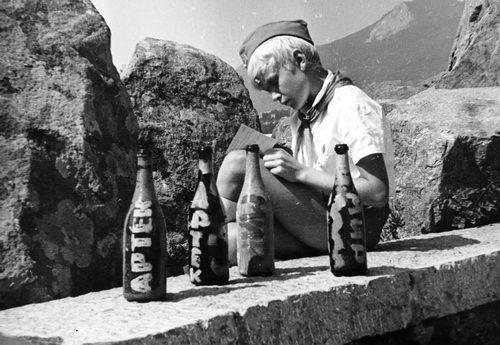
Eighties. Samantha Reed Smith.
During these years, the international life "Artek" still rages, without slowing the pace: are international change, international races, going to folk groups from 67 countries come high and the world-famous foreign guests. Amid all this maelstrom there was one event that hooked the hearts of many and for many years remained in the souls - the arrival in "Artek" little girl, a young ambassador of peace, American schoolgirl from Maine - Samantha Reed Smith.
Samantha once saw on the cover of the magazine «Time Magazine» US President Ronald Reagan and Soviet leader Andropov new as man of the year. In one of the articles of the magazine stated that the new Soviet leader is a very dangerous person, and that under his leadership the Soviet Union is, more than ever, threatening US security. Then Samantha asked her mother: "If Andropov's all so afraid, why not write a letter to him and asked if he was going to start a war?" The mother jokingly replied: "Well, write itself", and Samantha wrote.
April 26, 1983, she received a letter from Andropov, in which he assured her in a loving plans and invited to the Soviet Union in the "Artek".












Came in 1924. In a quiet autumn evening at the foot of Ayu-Dag walked arrived from Moscow Chairman of the Central Committee of ROKK Zinovy Petrovich Soloviev. He rested, admiring nature and deeply inhaled the crisp mountain-sea air, but his thoughts were far away.
His concern about the issue that as soon as possible to improve health of children, especially those who have suffered for years of imperialist and civil war and years of devastation. He dreamed of creating such institutions, "where doctors had to deal not only with the individual child, and with organized children's groups." Camp-resort, "medical camp" - that wanted to create Zinovy Petrovich.

Solovyov visited many places on the coast, visited Koktebel, near Feodosia, Sudak, figured here and there, but no matter what I could not stop. So, spending their holidays in the Crimean branch Gurzufsky military resort station (now the sanatorium "Gurzufsky"), Zinovy Petrovich walked in the tract Artek, which granted him in all respects.
Particularly pleased Solovyov fact that the campsite can be expanded over time, and the camp "will unfold in the real pioneer." A Place in the camp was chosen as it is impossible prosper.
No less successful was the organizer and the selection camp. Open to the beginning of 1925 sanatorium camp was entrusted to Dr. Fyodor Fyodorovich Shishmareva, who was then head of the children's sanatorium in Ai-Danil. FF Shishmarev played a significant role in the life "Artek". He gave him eight years of his life, working mainly stretch doctor. Exceptional organizer, a great doctor - he was the right hand 3. P. Solovyov in the organization of treatment and rest of children.

And June 16, 1925 in a cozy and picturesque bay, where peace and quiet guarding ancient Ayu-Dag, children's voices were heard, and the sounds of bugle flag was hoisted up - so in Crimea opened his first shift camp-resort of the Red Cross in the RSFSR " Artek ".

80 First Artek lived near the sea, four canvas tents. In the first year of "Artek" After four shifts took 320 children.
Children placed in tents, high, bright, with wooden floors. Although their decoration and consisted of simple wooden, covered with canvas beds, wooden stools and gross bedside tables, but all contained in a large order. The best tent was designed as an insulator, which stood on the camp at a distance.

Dining use the space under the tent, where it was placed six dining tables and benches. Although the tables were roughly knocked together from planks, covered with white tablecloths them, and each was a pioneer and napkin ring napkin.

Was organized as a club-library, which was assigned by the best room Potemkin house. There's also kept the children gathered collection, tools and materials for manual labor.
About the sea, which is now broken "campfire" area with an amphitheater for guests was sports grounds. Here, in the first years of the fires were lit Artek.

In the summer of 1925, "Artek" visits Clara Zetkin, who would later write: "Would you like to see happy children free? Visit summer camp hosted by the Red Cross in "Artek" ... ".

And foreign visitors began to visit and learn ... In the twenties in the camp rested children and adults from Germany, Holland, Denmark, Norway, Poland, France, Sweden.
July 24, 1927 in "Artek" put full-time counselor position of company officer. Teachers have been working on local history and natural history, guided tours, children were taught how to collect and prepare herbarium collections and read them lectures, were interviewed. On educational work was given 2-3 hours a day. In the daily routine included compulsory labor - children cleaned the park, clean beaches, as well as helping in the neighborhood agricultural economy. They gathered their vineyards, cleaned hay is harvested fruit.

Excursions in those years have been few. It was difficult, as in "Artek" there was no transport, and often the children brought from Sevastopol on horses harnessed to the droshky.
The first years of the camp showed that it was necessary to think about the permanent buildings instead of tents, which are not paid off. In the afternoon, when it was necessary to carry out "silent" h - hot night - cold. This became especially clear when one night a storm with strong thunderstorms, destroyed the tents and frightened children.
In 1928 Zinovy Petrovich raised the question of the reorganization of the camp in a permanent camp-resort that operates all year round.
And in the same year, the children no longer rested in the tents, and new houses.
Thirties. Camp international assistance and friendship.
In 1930, "Artek" celebrated its fifth anniversary of the opening of the second camp. Now in "Artek" appeared "lower" and "upper" camp. Change in the number of children increased from 80 to 200, and a year - to 2,040 children.

1932. The camp organized by Children's Technology Station and Museum "Artek».
In 1934, "Artek" was first visited by the head of the Soviet government - Vyacheslav Molotov.
In 1936, the government decided to transfer "Artek" located next holiday home Central Executive Committee of the USSR "Suuk-Su", which greatly expanded the possession of the camp.

In the "Artek" vividly respond to all the events happening in the world: in 1937, for the whole summer here come the children of war on Spain in flames.
In the summer of 1939 in "Artek" with his son Timur Arkady Gaidar rest. He loves to climb with Artek on Ayu-Dag. Here he decided to write his famous novel "The Military Secret».

The popularity of "Artek" has gone far beyond the Soviet Union. In each camp - the "upper", "lower", "Suuk-Su" to "15th dacha" - is working on their own: its ruler, camp flag, its senior leader, opening and closing shifts.

Enough time is allocated as fun and entertainment. Each unit except his gang work, takes hold of one of the camp activities - organize a competition for the best paper company officer, chess tournament, war game, recitals, sporting events ...


Life is full of diversity Artek - one day is like another, and daily diaries recording a company officer, as a rule, ended with the words: "Today, as always, it was fun," "more interesting than usual, was today».
"Artek" wartime. Revival.

1941. In the "Artek" only drove children and 22 June the Great Patriotic War. The very next day Artek sent a telegram to Moscow: "Resting in the sun" Artek ", always ready to defend the homeland." This change would later be called the longest in the history of the camp, it lasted three and a half years. Two hundred children from the western regions and republics, occupied by the Nazis, along with counselors, physician and head of the camp were evacuated to the rear - Altay Belokurikha resort village. The boys and adults lived in the Artek laws, helps families of soldiers, wounded in the hospitals, collected scrap metal for the construction of tanks and aircraft.

And the "Artek" was occupied. April 15, 1944 Independent Coastal Army troops liberated the "Artek". The camp lay in ruins.

Despite the difficult times of war, were started restoration work, and three months later - August 6, 1944 - Crimean camp hosted 500 children.
In 1945 a commemorative change in "Artek" already in 1200 rested guys. September 13 newspapers and radio reported the good news: in connection with the twentieth anniversary, for outstanding achievements in the education Pioneers Union sanatorium pioneer camp "Artek" them. VM Molotov was awarded the Order of the Red Banner.
In 1945, on the map, "Artek" appears camp "Cypress", a former rest home "kolkhoz youth."

And if before the war Artek help everyone in this difficult time began to come help them. In the spring of 1945 the wife of British Prime Minister Winston Churchill visited Clementine "Artek" and presented 15 canvas tents, became the basis of the post-war camps.
The summer of 1947 for the first time after the war to rest in "Artek" were invited to a group of children from Czechoslovakia and Poland. Children wrote: "We will forever be remembered ... the arrival in the Crimea. Everywhere we met with a simple, gentle, good people. And the beauty of the camp we just struck. We do not believe that all this can belong to children. We are so grateful for the care of children ... about us, for the sea, for the sun, for friendship, for songs that we learned here. " Artek together with their foreign guests had a bonfire dedicated to the friendship of Slavic peoples. With great joy young Czechs and Poles took from his friends Artek gifts and friendship embers from Artek bonfires.
Fifties. All flags are to visit us.
In the "Artek" come more and more foreign delegations from Bulgaria, Hungary, Czechoslovakia, the German Democratic Republic, China, Mongolia, Korea, Poland, Romania, Vietnam, France, Finland, England, Norway, Luxembourg, West Germany, Belgium, Albania , Sweden, Denmark.

The main pedagogical principles impact on child counselors considered alive, specific case, which is entirely should grab guys. Becoming popular relay race of peace and friendship festival "For peace and friendship," International Sports Games "Friendship».

There is a form of work, as a celebration of friendship. It was held on the green lawns of the park Upper Camp (now Park "Mountain"), there were fun rides in different places of the park - competitions, was equipped with a separate area of international friendship where you can write and send a letter to Artek postcard to share with your friends addresses .
Often passed the baton labor, for example, in the construction of the stadium in the Lower Camp (now "Marine") worked alongside children from Bulgaria, the German Democratic Republic, Czechoslovakia, Italy and Sweden.

Postwar "Artek" gets to his feet again and ready to help children around the world.
Characteristic of the time this episode: Belgian pioneers, leaving to his homeland, bitterly guys say that at home they can not do sports, no sports facilities and equipment. Only in "Artek" and played enough pleasure, and now do not play ... This conversation pioneers learned 4th camp session in 1959 and decided: we must help the Belgians. Board of sports club "Olympia" Invite the children to share sports equipment with Belgian pioneers. But the children offered another: "Let us work, work as it should, and with the money to buy equipment and send the Belgian friends." The proposal was approved. Council "Olympia" established "piggy bank friendship." The guys worked on the construction, parks and vineyards, amassing loungers on the beach, repairing furniture and clothes. In the piggy bank soon became more than 5000 rubles. With this money in Simferopol bought sports equipment, and a large box-parcel was sent to Belgium.
Sixties. International change.
Now children from abroad rest in "Artek" not only throughout the year, but also runs a special international change.
Developed its own traditions and customs: the baton of friendship, national days of countries, international voluntary Sunday, drawing 'Cup continents "of sports games, evening national games and dances, merry holiday attractions, evening meetings on the interests and many other fun and interesting things.

Peace Day has become a tradition. Usually in the morning rose the blue flags of the world, held a solemn line. From the pier "sea" of the camp in neutral waters left the boat with the Post World. Representatives of foreign delegations were thrown into the sea dozens of bottles with clogged in them a letter of appeal to children all over the world.

There was a tradition to sign the declaration or appeal against any social organization of the world, for example, the World Peace Council.

Were held International Children Sports Games "Friendship" with the participation of young athletes around the world.


Pass-Union Pioneer rallies, which involved numerous foreign delegations and high foreign guests: the head of the Iranian government, Amir Abbas Hoveyda, chairman of the Council of Ministers of the Republic of Chad Francois Trombalbay, the famous American astronaut Francis Borman, which the crew of the spaceship "Apollo - 8" in December 1968 made a flight to the moon.
Camp reacts and responds to all the events that occur in the world.
Seventies. "May there always be sunshine!»
"Artek" become a place of discussion, the main problem - the problem of preserving peace in the world. A major role in solving this problem was transferred to children's organizations and their important role in the education of children and adolescents in a spirit of friendship, peace and solidarity.

The conference "Multi-colored ties round table" of the seventies was attended by between 39 and 103 representatives of foreign children and youth organizations. The conference made presentations outstanding personalities of the time: The Secretary-General of the World Federation of Democratic Youth Michel Jouet, Secretary General of the United Democratic Youth Organization of Cyprus Andonakis Christodoulou and many others.

The main event in international life "Artek" seventies - International Children's Festival "May There Always Be Sunshine" (1977.), Who became a prologue to the XI World Festival of Youth in Cuba. The program provided its start in Moscow, and the continuation and the ending in "Artek».
Such proportions did not know the history of international children's movement. In the "Artek" was attended by 1500 children and 500 guests of honor of the 158 international, regional and national children's and youth organizations of 103 countries in the world.
To create a spirit of unity, solidarity, friendship organizers had thought every detail of the program, even coming in "Artek". Recalls journalist V. Kryuchkov, who covered the events of the festival, first of all the delegates gathered in Moscow (then the capital of the Union of Soviet Socialist Republics), handed over the symbolic key to "Artek", and then a special express friendship was sent to "Artek".

In these days of "Artek" running club "Naturalist", "Breeze", "collector", "Humanity", "Chess and Checkers", "symbol", "Game", "Skillful hands", "screen", where children demonstrated their skills, share experiences.
During the festival is a traditional conference of heads of children's and youth organizations under the slogan "For a happy childhood in a peaceful world».
The festival has left an indelible impression on all participants. Here, for example, statements of Eric Makkasi, a member of the children's section of the National Council of American-Soviet Friendship, "in" Artek "... flags on the mast raised are not ordinary, but of colorful neckties. Bonfires are lit solidarity is not a lighter or matches, and from the sun. A symbolic key was handed in Moscow, drove around the "Artek". Not forgotten in "Artek" and "Maritime mail" that has existed since ancient times. Now, when the world hangs communications satellites and telegraph cable laid in all corners of the globe, "shipping service" may seem to someone naive idea. But I personally like to think that in the sea waves floats my bottle with my letter. I try to imagine: who it was fished out of the sea. Sailor? Tourist? Fisherman?

Eighties. Samantha Reed Smith.
During these years, the international life "Artek" still rages, without slowing the pace: are international change, international races, going to folk groups from 67 countries come high and the world-famous foreign guests. Amid all this maelstrom there was one event that hooked the hearts of many and for many years remained in the souls - the arrival in "Artek" little girl, a young ambassador of peace, American schoolgirl from Maine - Samantha Reed Smith.
Samantha once saw on the cover of the magazine «Time Magazine» US President Ronald Reagan and Soviet leader Andropov new as man of the year. In one of the articles of the magazine stated that the new Soviet leader is a very dangerous person, and that under his leadership the Soviet Union is, more than ever, threatening US security. Then Samantha asked her mother: "If Andropov's all so afraid, why not write a letter to him and asked if he was going to start a war?" The mother jokingly replied: "Well, write itself", and Samantha wrote.
April 26, 1983, she received a letter from Andropov, in which he assured her in a loving plans and invited to the Soviet Union in the "Artek".

